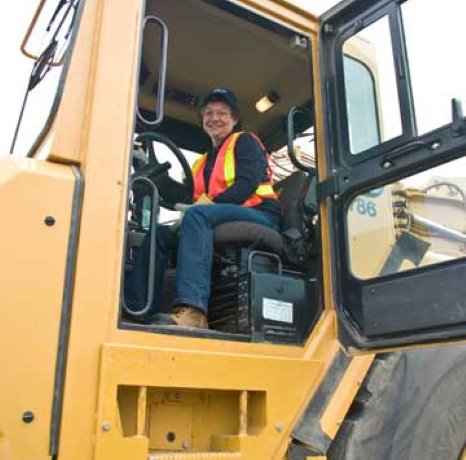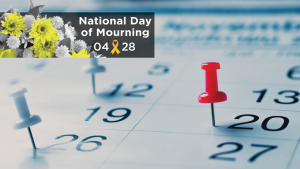Fifteen women from across Alberta recently completed a 17-week program to help them pave the road – figuratively and literally – toward careers as heavy equipment operators.
Training
Fifteen women from across Alberta have recently completed a 17-week program to help them pave the road – figuratively and literally – towards a career as heavy equipment operators.
Although not a recognized trade in the province, graduates of the program received certificates from Olds College and Women Building Futures, the two organizations that partnered to develop and implement the training program.
In addition to 17 weeks of training on eight different pieces of heavy equipment, the students obtained a variety of certificates including transportation of dangerous goods, confined space awareness, ground disturbance and others.
Wanda Wetterberg, operations manager for Women Building Futures anticipates that the exodus of baby boomers from the workplace, combined with the student’s hands-on experience with loaders, graders and dozers, will help open the doors wider for women in the field.
• Feds invest over $250,000 in Women Building Futures
• Alberta Pipe Trades College ready to open the valve on training
“There is and will continue to be quite a heavy demand for heavy equipment operators,” she said, adding that the same holds true in other trades.
“Even if the construction industry has slowed down a bit, the demand for operators is still pretty high. And it certainly does pay well. That’s what our students are looking for,” she said.
Carolyn Macpherson is one of the students looking for a promising future in the trade. She found herself looking for work in the small community of Boyle, Alberta after she and 67 co-workers were given a week and a half notice that their jobs were being terminated.
“I didn’t have the skills needed to go out into the field that I wanted to, which is back in the oil patch to operate equipment and what not,” she said, adding that she learned about the program while searching for employment opportunities online and was happy to be accepted.
The bulk of Macpherson’s education was spent learning the safe operation of loaders, scrapers, graders, dozers, excavators, rollers and their attachments, in class and in the field at Villeneuve, a hamlet 26 kilometres northwest of Edmonton.
At first, she wasn’t particularly fond of operating the scrapers.
“It’s not the most ergonomic, but the newer ones are a bit more,” Macpherson said.
“But, getting out there and learning how to use it was really good. I was scared to death of it because it looks like a monster, but once I got in there and learnt what works what, and how it works, I started to really enjoy it towards the end. Now I’m thinking, yeah, I’d operate it again.”
In addition to learning how to maintain and operate the equipment, Macpherson and her fellow students were also taught how to deal with the attitudes of other workers.
“We had women’s culture, which kind of gets you ready to go out there to work on the site with the guys,” she said.
The program helped prepare them for being evaluated based on their gender rather than their skills, abilities and competency.
“You’re going to come up against a lot of people that don’t want you there,” she said.
Part of the learning dealt with potential objection or rejection and involved role playing with negative comments, put downs and rough language.
“You can’t go having a hissy fit or tears out there,” she said.
“You’ve got to be strong and put on the face that you’re there to work. But in the same sense, you don’t have to take any abuse. You have the right to a work environment that’s comfortable for you too. If somebody’s harassing you, you don’t put up with that.”
So far, Macpherson has encountered nothing but positives when talking to people about the operator’s course.
“Everyone was so encouraging,” she said.
Some men have even asked her to talk to their wives about the program.
As confident as she is, Macpherson said she knows that there is still much work to do, building on the knowledge and experience she has acquired over the summer.
She realizes she is not yet a skilled operator, but she also knows that she has the skills to operate and maintain the machinery.
“Experience will make us the operators,” she said.
Macpherson will build on that experience during job placement and future employment as a heavy equipment operator.
The final component of the program includes a two-week work practicum, which each student must set up and interview for.
The hope is that the students will remain behind the wheel of the equipment once the two weeks of practicum is complete.
“The economy’s getting better, so I’m very optimistic about it,” Macpherson said.
“I think the future’s going to be really good for all of us.”
With one class of women operators recently graduated, another class of 12 is already set to start in Edmonton on Sept. 14, with plans for two more in the spring – one will be in Edmonton and the other in Lac La Biche










Recent Comments
comments for this post are closed